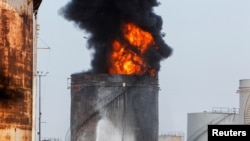A fire Monday at one of Lebanon’s main oil storage facilities is the latest challenge to the country’s electric power supply. Over the weekend, fuel shortages forced the shutdown of Lebanon’s two biggest power plants, plunging large parts of the beleaguered country into total darkness. Observers warn that the dire situation cannot continue as the energy and interior ministers investigate.
Civil defense units took several hours Monday morning to extinguish the blaze at the Zahrani oil installation, near one of Lebanon’s main power stations, located some 8 kilometers outside the southern city of Sidon on the Mediterranean coast.
While fire fighters battled the blaze, the Lebanese army cooled nearby fuel tanks to prevent them from catching fire, and diverted traffic away from the area amid fears of a potential explosion.
Energy Minister Walid Fayad said the fire “broke out abruptly during the transfer of gasoline from one tank to another ahead of delivery,” adding a probe will reveal the causes of the fire, according to the National News Agency.
This latest incident underscores the extreme fragility of Lebanon’s energy infrastructure as fuel shortages forced the shutdown of power plants at Zahrani and Deir Ammar in the north over the weekend, depriving ordinary Lebanese of even the one to two hours a day of electricity they were receiving.
Power was restored Sunday to the levels before the blackout, after the Lebanese army provided 6,000 kiloliters of gas oil to the two power stations, the energy ministry said.
The Lebanese have struggled with meagre supplies of state-generated power for months amid a fuel shortage, which many blame on supplies being smuggled to neighboring Syria where they are sold for more money.
Meanwhile, Iran-backed Hezbollah militia and political party, the country’s powerbroker, has brought in Iranian fuel despite the threat of sanctions.
Professor Habib Malik of the Lebanese American University told VOA that the situation is untenable and urged the U.S. and European allies to help Lebanon.
"Fuel, diesel oil, these are absolutely vital for a country. Lebanon will either totally collapse or fall into the wrong hands," he said. "It seems now to be falling deeper and deeper into the wrong hands. This comes after a year and a half of total neglect and none of this is comprehensible. It doesn’t cost much to make a difference in Lebanon. Just get the monkey of the mafia-militia cartel off our back.”
Malik says a U.S. plan for supplying electricity to Lebanon with help from Egypt, Jordan and Syria has been too slow.
Lebanese Prime Minister Najib Mikati met Jordan’s King Abdullah in Amman Sunday where he was promised support, while a Beirut visit by Iranian Foreign Minister Hossein Amir-Abdollahian with promises of additional fuel drew local criticism.
Lebanon’s influential Maronite Catholic Patriarch Bechara Boutros Al-Rahi on Sunday said that “as much as Lebanon... needs the help of its friends and international monetary institutions, the state must preserve the country’s independence, sovereignty, and normal relations, so that some in-kind aid is not a cover for dominating Lebanon and undermining its identity.”
Beirut’s Nidaa Al-Watan newspaper said observers understood the remark as expressing concern over “the danger of annexing the country to the Iranian agenda under the guise of aiding it in oil, electricity and development.”
Some information for this report came from Reuters.




